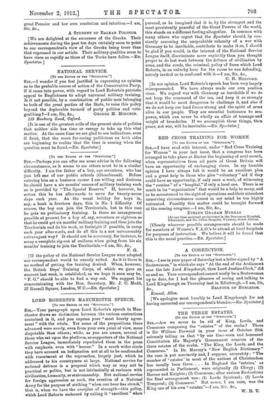LORD ROBERTS'S MANCHESTER SPEECH. [To THE EDITOR 07 THE "
SPECTATOR."1
Sin,—Your paragraph upon Lord Roberts's speech in Man- chester draws no distinction between the various contentions contained in it, and you express your " most hearty agree- ment" with the whole. Yet some of the propositions there advanced were surely, even from your own point of view, more disputable than others; while, as you are aware, several of those who sat upon the platform, as supporters of the National Service League, immediately repudiated them in the press with emphasis, even with " horror." In a much wider circle they have aroused an indignation not at all to be confounded with resentment at the reproaches, largely just, which he addressed to his countrymen at large. National service for national defence is a proposal which may or may not be practical or politic, but is not intrinsically at variance with civilization, humanity, or statesmanship. But national service for foreign aggression as such, the creation of a National Army for the purpose of striking " when our hour has struck," that is, when we have the overplus of strength—this policy, which Lord Roberts endorsed by calling it " excellent " when pursued, as he imagined that it is, by the strongest and the most persistently peaceful of the Great Powers of the world, this stands on a different footing altogether. In common with many others who regret that the Spectator should, by con- stoutly assuming the unspeakable calamity of a war with Germany to be inevitable, contribute to make it so, I should be glad if you would, in the interest of the National Service League itself, discriminate more explicitly than you thought proper to do last week between the defence of civilization by arms, and the crude, the criminal, policy of force which Lord Roberts, in an unlucky hour for the cause he was defending, naively invited us to confound with it.—I am, Sir, &a., 0. H. HERFORD.
[In our opinion Lord Roberts's speech has been very largely misrepresented. We have always made our own position clear. We regard war with Germany as inevitable if we do not keep the command of the sea, and keep it so strongly that it would be most dangerous to challenge it, and also if we do not keep our land forces strong and the spirit of arms alive in our people. They are essential buttresses to sea- power, which can never be wholly an affair of tonnage and weight of broadsides. If we accomplish these things, then peace, not war, will be inevitable.—ED. Spectator.]


























































 Previous page
Previous page